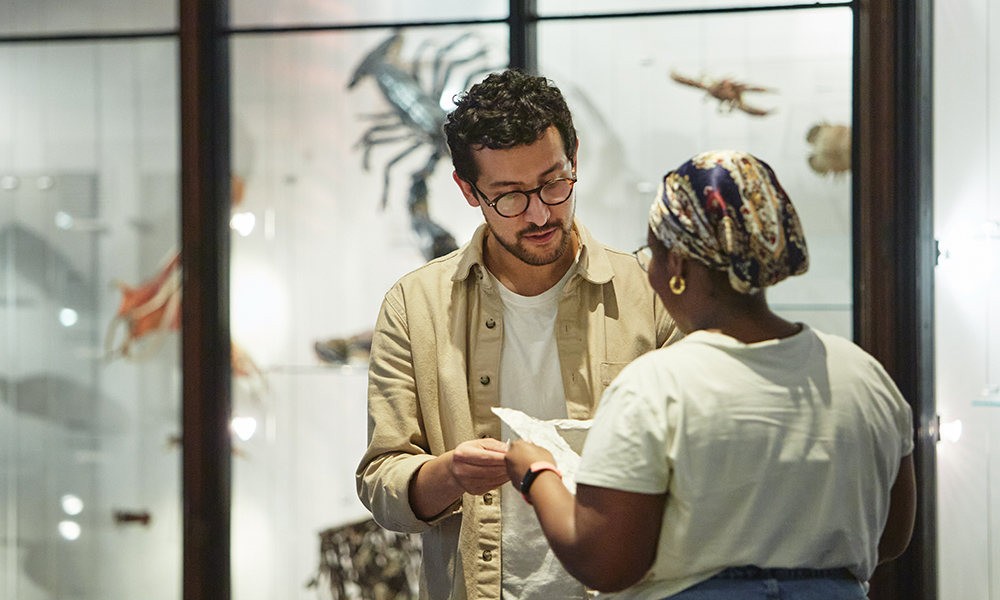- Attenborough Studio
- Saturday 3 May, 13.30–14.30
- Free, booking required

From Cotton to Frogs: Reproductive Rights through Collections and Colonialism
Uncover hidden histories of reproductive health in this thought-provoking event exploring collections, culture and colonialism through storytelling and discussion.
Who’s shaped our understanding of reproductive health, and whose knowledge has been overlooked? This discussion reveals how power, resistance and empire have influenced reproductive justice.
Through the botanical collections we care for, we’ll explore links between plants, the slave trade and Indigenous knowledge, including how enslaved women used plants to control fertility. We’ll also examine the global trade of African clawed frogs for use in pregnancy tests and how apartheid in South Africa has meant that advances in medical research haven’t been equally shared.
Science and medicine have long been shaped by racism and colonialism, often in ways that still impact us today. Join historians and writers as we connect past injustices to the present, exploring how medical knowledge has been marginalised and how we can reclaim these histories.
Discover the role of collections and museums in shaping cultural narratives and how we can build a more equitable future.
Speaker bios
Isabel Davis
Isabel is a Research Theme leader in Collections and Culture at London’s Natural History Museum. She supports arts and humanities researchers to conduct work on the specimens, library and archive collections the Museum looks after. A particular priority of hers is to surface the colonial histories and legacies of the collections the Museum care for. She’s a cultural historian and author of the book Conceiving Histories: Trying for Pregnancy, Past and Present. She’s particularly interested in the environmental questions in histories of human fertility and infertility.
Akosua Paries-Osei
Akosua is a Technē-funded PhD candidate at Royal Holloway, University of London. Her Racial Justice placement at London’s Natural History Museum was in Botany and the Sloane Herbarium. Her research area is slavery and the history of science. Akosua is specifically interested in the botanical reproductive resistance of enslaved women from West Africa and how that knowledge has been incorporated into modern medicine.
Dr Annabel Sowemimo
Annabel is a London-based consultant in Community Sexual and Reproductive Health in the NHS as well as an academic, activist and writer. She founded the Reproductive Justice Initiative – an award-winning charity addressing health inequalities and racial disparities. In 2024 she won the inaugural award for Health Equity Champion at the Curah-H Awards. She’s a part-time PhD candidate and Harold Moody Scholar at King’s College London where her research focuses on the experiences of Black women in Britain with fertility control methods. Annabel is interested in tackling gender-based violence and improving access for marginalised groups. Her first book Divided: Racism, Medicine and Decolonising Healthcare was published by Profile Books/Wellcome Collection in April 2023 and was shortlisted for the Orwell Prize for Political Writing.
Mitzi Jonelle Tan
Mitzi is a full-time climate justice activist based in Metro Manila, the Philippines. She’s on the Steering Committee of Youth Climate Justice Fund and the Fossil Fuel Non-Proliferation Treaty. She works with Fridays for Future International and Fridays for Future Most Affected Peoples and Areas making sure that voices from the Global South are heard, amplified and given space. Mitzi is a strong voice on anti-imperialism, anti-colonisation and the intersectionality of the climate crisis. She’s committed to changing the system and building a world that prioritises people and the planet, not profit, through collective action.
Visiting information
- All ages are welcome, but content is recommended for ages 16+.
- This venue is wheelchair accessible.
- Arrive at the venue 15 minutes before the start of the event.
- The event will be an hour long. After the event there will 30 minutes for you to chat to the speakers and each other.

Join our community of planet fixers
Enter your email below to get monthly tips on living sustainably as well as articles, events and information to help you become an advocate for our planet. We may occasionally include information about other parts of the Museum or third-party content from our corporate partners and other museums. We will not share your personal details with these third parties. You must be over the age of 13. Privacy notice.
Follow us on social media